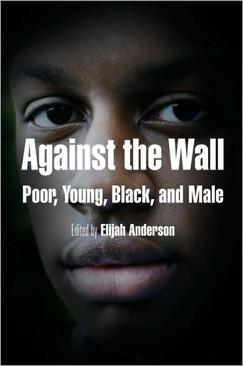 Against the Wall
Against the Wall
Poor, Young, Black, and Male
Edited by Elijah Anderson, Foreword by Cornell West
320 pages | 6 x 9 | 14 illus.
Paper 2009 | ISBN 978-0-8122-2017-9
A volume in the City in the Twenty-First Century series
View table of contents
“Outstanding title! Anderson led the way for understanding urban black males with his ethnographic research. . . . In this book, other internationally renowned scholars join him to discuss different aspects of the barriers to success and the strategies the men use to effect the best possible outcomes. In brief, this collection is the most important on this subject to come along in the past 30 years. Its insights are indispensable. . . . A remarkable accomplishment—kudos to Anderson.”—Choice
“The hazy glow of Barack Obama’s election has made it too easy to forget the plight of millions of young black males in inner cities who live in desperate circumstances. In his earlier work, Elijah Anderson has conveyed impressive insights about their lives; in this volume, he has collected excellent authors who have described with considerable sensitivity and detail the factors contributing to their circumstances: poverty, discrimination, joblessness, crime, incarceration, suicide, drugs, poor schools, preoccupation with sports, and handguns. Against the Wall documents the problems admirably and offers some suggestions for improvement.”—Alfred Blumstein, Carnegie Mellon University.
“Anderson has consolidated what is known about the dire and worsening social situation of young black men in the U.S. Against the Wall brings together a set of cutting edge empirical studies from sociology, economics, and cultural studies to present a nuanced and sobering picture.“—Mitchell Duneier, Princeton University, author of Sidewalk and Slim’s Table
“In a time when much of white America is in economic pain, Against the Wall is a timely and wide ranging reminder of the much greater and centuries longer pains which have been inflicted on poor young African Americans.”—Herbert J. Gans, author of Imagining America in 2033: How the Country Put Itself Together After Bush
“With A-to-Z thoroughness, Elijah Anderson and colleagues foreground the destructive legacies of centuries of systemic racism for today’s young black men. Life histories on harsh streets, structural bars of job-flight and employer profiling, yeoman attempts at social-program redress, innovative thinking about future policies are webbed together in data-based, readable essays for all seeking answers to U.S. racism’s chronically inhumane consequences.”—Joe R. Feagin, author of Systemic Racism
“A brilliant young black man has been elected President, while our prisons are crowded with black men and millions of others are on the street with no future. President Obama, who has seen the crisis on the streets of Chicago’s south side, needs to send his Cabinet copies of Elijah Anderson’s powerful new book, with its all-star collection of penetrating studies of the dynamics of the crisis and its possible solutions.”—Gary Orfield, UCLA
Selected by Choice magazine as an Outstanding Academic Title
Typically residing in areas of concentrated urban poverty, too many young black men are trapped in a horrific cycle that includes active discrimination, unemployment, violence, crime, prison, and early death. This toxic mixture has given rise to wider stereotypes that limit the social capital of all young black males.
Edited and with an introductory chapter by sociologist Elijah Anderson, the essays in Against the Wall describe how the young black man has come to be identified publicly with crime and violence. In reaction to his sense of rejection, he may place an exaggerated emphasis on the integrity of his self-expression in clothing and demeanor by adopting the fashions of the “street.” To those deeply invested in and associated with the dominant culture, his attitude is perceived as profoundly oppositional. His presence in public gathering places becomes disturbing to others, and the stereotype of the dangerous young black male is perpetuated and strengthened.
To understand the origin of the problem and the prospects of the black inner-city male, it is essential to distinguish his experience from that of his pre-Civil Rights Movement forebears. In the 1950s, as militant black people increasingly emerged to challenge the system, the figure of the black male became more ambiguous and fearsome. And while this activism did have the positive effect of creating opportunities for the black middle class who fled from the ghettos, those who remained faced an increasingly desperate climate.
Featuring a foreword by Cornel West and sixteen original essays by contributors including William Julius Wilson, Gerald D. Jaynes, Douglas S. Massey, and Peter Edelman, Against the Wall illustrates how social distance increases as alienation and marginalization within the black male underclass persist, thereby deepening the country’s racial divide.
Elijah Anderson is William K. Lanman, Jr., Professor of Sociology at Yale University and the author or editor of many books, including A Place on the Corner and Code of the Street: Decency, Violence, and the Moral Life of the Inner City.
Cornel West is Class of 1943 University Professor of Religion, Center of African American Studies at Princeton University. Among his books is the best-selling Race Matters.